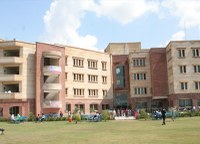 The centrepiece of COMSATS' efforts lies in the work of its 16 centres of excellence. "Our goals,” says Imtinan Qureshi, executive director of COMSATS, “can be easily summed up: When scientists learn something new that will benefit society, it deserves to be shared with others."
The centrepiece of COMSATS' efforts lies in the work of its 16 centres of excellence. "Our goals,” says Imtinan Qureshi, executive director of COMSATS, “can be easily summed up: When scientists learn something new that will benefit society, it deserves to be shared with others."
Participants in the TWAS-hosted 13th annual meeting of the Coordinating Council of the Commission on Science and Technology for Sustainable Development in the South (COMSATS), did just that during two days of discussions in which they exchanged information about successful initiatives undertaken by COMSATS’ member institutions.
The COMSATS Institute of Information Technology (CIIT) in Pakistan was one of the successful case studies that were examined at the meeting.
When CIIT was established in 1998, the Internet was still in its infancy, especially in the developing world. Thanks to another COMSATS project launched two years earlier, the COMSATS Internet Services (CIS), CIIT was in the fortunate position of having CIS's campus-wide IT infrastructure at its disposal.
"CIS," Qureshi notes, "sought to become a focal point for the development of information technologies in Pakistan. CIS also quickly took steps to establish Internet service throughout the entire country."
While CIS soon became one of the leading Internet service providers in Pakistan, CIIT assumed the role of a university, offering training and research courses for students interested in information technologies. When the institute was launched in 1998, it had just 300 students. Today there are 16,000.
Prompted in large measure by CIS's aggressive strategy for growth, the original digital infrastructure, consisting of a single campus-wide server, has expanded into a network that now encompasses six of the largest cities in Pakistan. Industries, banks, businesses, commercial centres and health services are now linked together in an electronic web of information.
eHealth, which allows for online medical care, is one of the most valuable by-products of COMSATS' efforts to promote the development of information and communication technologies in Pakistan. "Thanks to eHealth," Qureshi notes, "basic health care services are now readily available even in villages located in Pakistan’s isolated mountainous regions."
Drawing on training and research skills of its staff, COMSATS first sponsored a pilot project in a village 40 kilometres from Islamabad. "We gave physicians in Islamabad access to computers at the COMSATS secretariat," Qureshi explains. "From there, they were able to link to a satellite centre in the test village."
COMSATS not only devised and implemented the project but also examined the project's impact to determine whether physicians in Islamabad were able to provide adequate care by relying on local paramedic personnel to interact directly with the patients.
"Our studies," says Qureshi, "showed that health care did indeed improve."
Based on this initial success, CIIT began a larger field trial in a mountainous region some 300 kilometres from Islamabad. "Medical services for the most common health issues are now guaranteed for residents living in villages participating in the project," Qureshi says. "Efforts to treat commonplace skin diseases, aggravated by the harsh environment and the less-than-ideal sanitary conditions, have proven particularly successful."
Today, three large Pakistani hospitals are expanding eHealth technologies. In line with COMSATS' philosophy of sharing successful experiences, the project experience is being offered to all COMSATS' member countries.
"The eHealth initiative is something we can all be proud of," Qureshi says. "It represents a worthy effort designed to harness science and technology in ways that help improve peoples’ lives. It deserves both praise and emulation."

